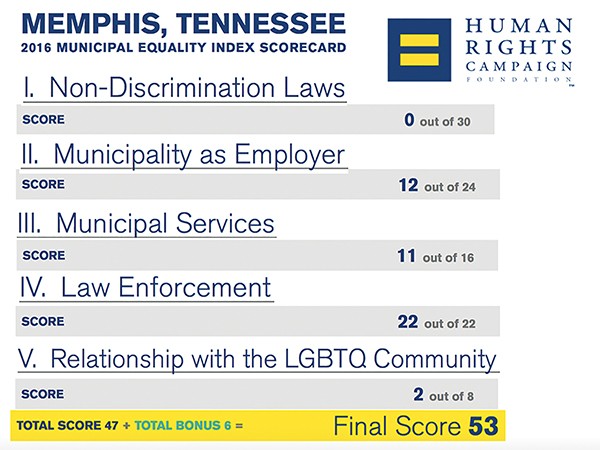Memphis ranked third of Tennessee’s eight largest cities on the Human Rights Campaign’s (HRC) fifth-annual Municipal Equality Index, an evaluation of how inclusive laws, policies, and services are for lesbian, gay, bisexual, and transgender (LGBT) people across the United States.
Scoring slightly lower than its neighbors to the east, Memphis received a 53 out of 100 rating. Knoxville received a score of 55, while Nashville, at number one, scored at 60. The average score for cities in Tennessee was 33 out of 100 points, below the nationwide mean of 55.
Though the state has a way to go in making substantial changes for the LGBT community, Chris Sanders, executive director of the Tennessee Equality Project, said the state is making progress.
“Cities in Tennessee present real opportunities to advance equality in meaningful ways,” Sanders said. “The challenges remain considerable, but a growing number of Tennesseans are tired of discrimination.”
HRC, in partnership with Equality Federation Institute (EFI), assessed 506 U.S. cities and scored them on a scale of 0-100 based on 44 criteria that fall across five categories. Those include non-discrimination laws, municipal employment policies including transgender-inclusive insurance coverage, and non-discrimination requirements for contractors, inclusiveness of city services, law enforcement including hate crimes reporting, and municipal leadership on matters of equality.

“Despite another year of legislative attacks on LGBTQ equality, we are not merely holding our ground — we also continue to make significant gains across the country,” said Rebecca Isaacs, executive director of EFI.
On non-discrimination laws, a category evaluating whether discrimination on the basis of sexual orientation and gender identity is prohibited by the city, county, or state in areas of employment, housing, and public accommodations, Memphis received a score of 0 out of 30. The Memphis City Council, however, approved an ordinance in 2012 that prohibits discrimination on the basis of sexual orientation and gender identity. Still, Tennessee doesn’t allow individual municipalities to pass more inclusive laws than the state, which can be a hurdle for cities, said Will Batts, executive director of OUTMemphis.
“Getting laws passed takes a long time,” Batts said. “But expressing that desire as a city for us to be more welcoming and more safe for people is a huge first step.”
Inclusive housing for members of the LGBT community, specifically transgender men and women, has been a point of contention in the city. Last month, homeless advocates marched to the steps of the Memphis Housing Authority to protest and demand an LGBT shelter. OUTMemphis is working with Community Alliance for the Homeless to help area shelters be more accommodating and follow policies set by federal funding.
“If you’re a transgender woman, it’s not safe for you to go to a men’s shelter, and they don’t want to let you into the women’s shelter, so that means there’s no place for you to go,” Batts said.
The organization is also in the early stages of opening the Metamorphosis Project, Batts said, an emergency shelter for LGBT youth.
“Statistics show that even though we only make up eight percent or 10 percent of the overall population, our kids make up between 40 to 50 percent of young people on the street,” Batts said.
While city employment scored a six out of six for non-discrimination, and while the city received a five-out-of-five score for having an LGBT liaison in Mayor Jim Strickland’s office, Memphis offers no health-care benefits for transgender people. However, employees from 86 municipalities have access to transgender-inclusive healthcare benefits this year — up from 66 in 2015 and just five in 2012.
“We’re trying to build the case that there needs to be a change in practice,” Batts said.